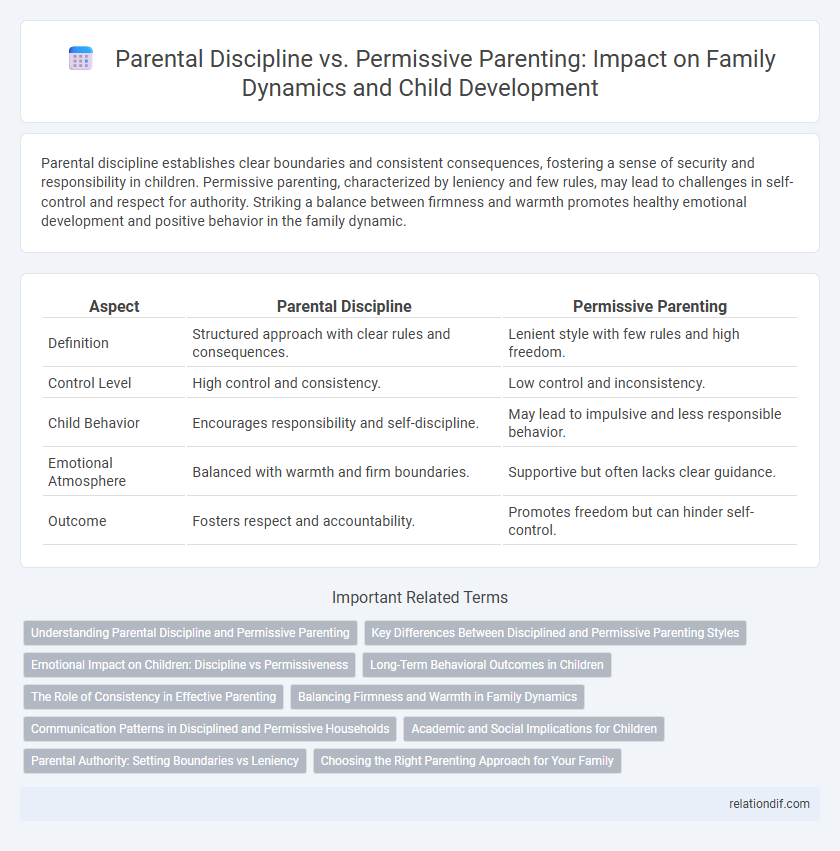Parental discipline establishes clear boundaries and consistent consequences, fostering a sense of security and responsibility in children. Permissive parenting, characterized by leniency and few rules, may lead to challenges in self-control and respect for authority. Striking a balance between firmness and warmth promotes healthy emotional development and positive behavior in the family dynamic.
Table of Comparison
| Aspect | Parental Discipline | Permissive Parenting |
|---|---|---|
| Definition | Structured approach with clear rules and consequences. | Lenient style with few rules and high freedom. |
| Control Level | High control and consistency. | Low control and inconsistency. |
| Child Behavior | Encourages responsibility and self-discipline. | May lead to impulsive and less responsible behavior. |
| Emotional Atmosphere | Balanced with warmth and firm boundaries. | Supportive but often lacks clear guidance. |
| Outcome | Fosters respect and accountability. | Promotes freedom but can hinder self-control. |
Understanding Parental Discipline and Permissive Parenting
Parental discipline involves setting clear boundaries and consistent consequences to guide children's behavior, fostering responsibility and self-control. Permissive parenting, characterized by high responsiveness but low demands, often results in fewer rules and limited enforcement, which can lead to challenges with authority and self-discipline in children. Understanding these approaches highlights the impact of parental strategies on child development and behavioral outcomes within the family dynamic.
Key Differences Between Disciplined and Permissive Parenting Styles
Disciplined parenting emphasizes consistent rules, clear boundaries, and structured consequences to promote accountability and self-control in children, whereas permissive parenting often lacks firm guidelines, prioritizing child freedom and leniency over order. The key difference lies in the balance of authority, with disciplined parents enforcing expectations while permissive parents avoid confrontation to maintain harmony. These contrasting approaches impact child behavior, emotional development, and long-term social responsibility.
Emotional Impact on Children: Discipline vs Permissiveness
Parental discipline fosters emotional resilience and self-regulation in children by establishing clear boundaries and consistent consequences, promoting a secure sense of trust and accountability. Permissive parenting often leads to difficulties in emotional control and increased anxiety as children struggle with a lack of structure and inconsistent expectations. Studies reveal that balanced discipline correlates with higher self-esteem and better social competence, while permissiveness is linked to emotional instability and behavioral issues.
Long-Term Behavioral Outcomes in Children
Parental discipline characterized by consistent boundaries and clear expectations promotes long-term behavioral self-regulation and social competence in children. Permissive parenting, marked by leniency and lack of structure, often correlates with increased risk of impulsivity, emotional insecurity, and difficulty adhering to social norms. Research indicates that balanced disciplinary approaches foster adaptive coping mechanisms and resilience, whereas permissive styles may contribute to behavioral problems and academic challenges.
The Role of Consistency in Effective Parenting
Consistency in parental discipline creates clear boundaries that foster children's understanding of acceptable behavior and consequences, promoting emotional security and self-discipline. Permissive parenting often lacks this consistency, which can lead to confusion, testing limits, and behavioral issues in children. Maintaining consistent rules and responses enhances effective parenting by reinforcing expectations and supporting healthy child development.
Balancing Firmness and Warmth in Family Dynamics
Balancing firmness and warmth in family dynamics requires parents to establish clear boundaries while nurturing emotional connection and understanding. Parental discipline promotes consistency and structure, fostering respect and accountability, whereas permissive parenting emphasizes empathy and flexibility, encouraging open communication and trust. Effective family relationships emerge when firmness is tempered with warmth, creating a supportive environment that guides children's behavior without compromising their sense of security and love.
Communication Patterns in Disciplined and Permissive Households
Disciplined households typically exhibit clear, consistent communication patterns where expectations and consequences are openly discussed, fostering a structured environment for children. Permissive parenting often involves more lenient communication with fewer boundaries, leading to children expressing preferences freely but sometimes lacking guidance. Effective communication in disciplined families promotes responsibility and self-regulation, while permissive communication emphasizes emotional expression and autonomy with limited behavioral control.
Academic and Social Implications for Children
Parental discipline that maintains clear boundaries and consistent consequences fosters children's academic achievement and social competence by promoting self-regulation and responsibility. In contrast, permissive parenting, characterized by leniency and lack of enforcement, often correlates with lower academic performance and difficulties in peer relationships due to insufficient behavioral guidance. Research indicates that authoritative parenting, blending discipline with warmth, optimizes children's educational outcomes and social skills development.
Parental Authority: Setting Boundaries vs Leniency
Parental discipline emphasizes establishing clear boundaries and consistent rules to provide children with structure and security, fostering respect for authority and self-discipline. In contrast, permissive parenting often features leniency and minimal enforcement of rules, which may lead to challenges in behavior regulation and reduced respect for parental authority. Research highlights that balanced authority with appropriate boundaries supports healthy child development and emotional well-being.
Choosing the Right Parenting Approach for Your Family
Choosing the right parenting approach depends on understanding the balance between parental discipline, which emphasizes setting clear boundaries and consistent consequences, and permissive parenting, which favors warmth and leniency but may lead to less structure. Research shows that children benefit from authoritative parenting styles that combine firm guidance with emotional support, promoting healthy development and self-regulation. Tailoring discipline methods to your child's temperament and family values strengthens communication and fosters a positive home environment.
Parental discipline vs Permissive parenting Infographic

 relationdif.com
relationdif.com